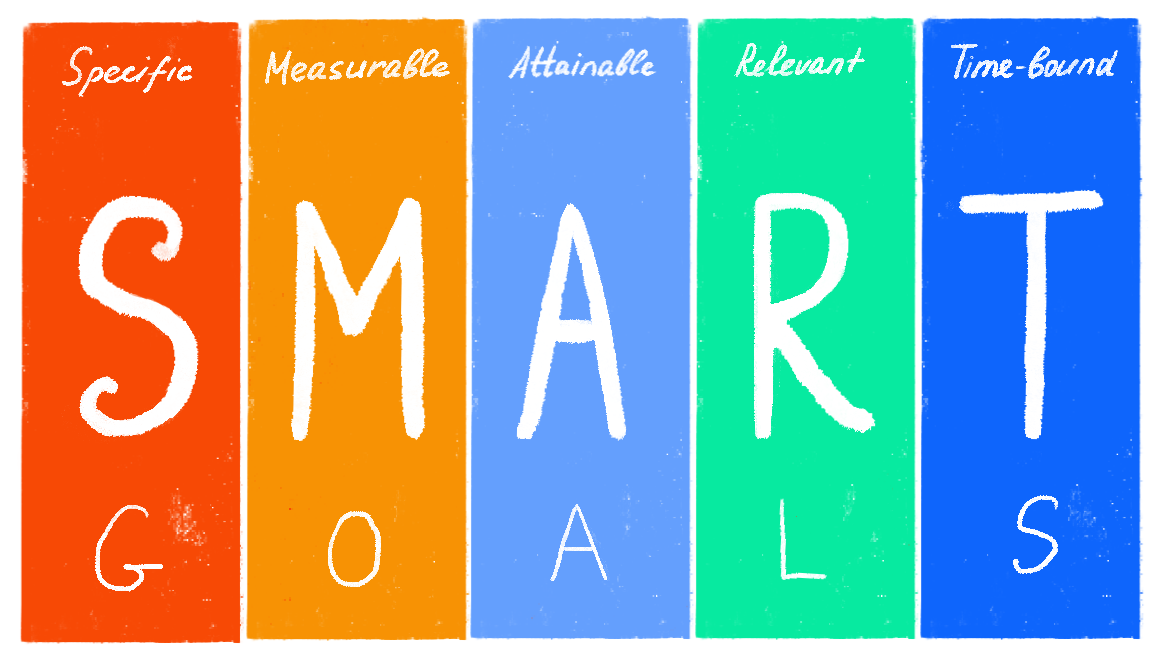15 Examples of Work Goals for Your Career in 2026
Explore a variety of work goal examples to help you set meaningful and achievable goals in your professional life. Boost your productivity and success with our comprehensive guide.

Do you feel like you're just moving along at work with no real aim or reason?
Setting work goals properly is the best way to build your job skills and get real wins.
But what are work goals, and why are they important at all?

Work Goals Definition & Why They Matter
Think of goals as the map for your job journey.
If you don't have them, you might work long weeks and do lots of tasks, but getting a promotion, moving to the job you dream of, or getting the skills you want could be hard.
By definition, job goals are clear, set targets with a deadline. They make you grow at work—like learning to code in Python in six months, heading a team by the end of the year, or moving from a position of marketing assistant to the product marketing manager in two years.
Most importantly, they must:
- Fit your values
- Use your best skills
- Match what you truly care about.

Work goals help you in four big ways.
More focus and work done: Goals help you pick what to do each day. Instead of looking at every message or going to every meeting, you work on the client presentation that lets you shine or the course that makes you look good. You skip the small stuff for big moves.
Better drive: Finishing your first project, getting a good word from your boss, or starting a big ad campaign makes you want to do more. Every step, from small stuff like an upgrade on negotiation skills to big wins like getting a top job, makes you ready to do more.
Better work: Goals set a clear vision for the future. You can see a real picture for the present: you want to lift your selling rate from 15% to 22%, cut down project time by 30%, or meet 50 big names in your field. This info shows where you shine and where you need to get better.
Progress and growth: Goals fill the gap between where you are and where you want to be. If you aim to be a data expert, your goals might be finishing a course, helping on open projects, and making a bunch of smart models. Every goal builds up the skills, expands your portfolio, and gives you confidence to move forward.
The SMART Formula for Powerful Work Goals
The quality of your goals will determine the level of achievement.
A tried-and-true strategy for creating goals that will advance your career is the SMART framework: Specific, Measurable, Achievable, Relevant, and Time-bound.
Specific: Clearly state your goals. Aim to "reduce customer wait times by 10% within the next quarter" rather than "improve customer service."
Measurable: To quantify is your objective. Why is it important? It enables you to monitor advancement in specific numbers and reach milestones more confidently.
Achievable: Goals must be difficult - otherwise, they are not creating a foundation for growth, but they must be reachable (it means, realistic). Without being rooted in reality, they will just sap your motivation.
Relevant: The professional objectives should be built in the bigger picture if you are an employee. In other words, they must be aligned with your own and the company's goals.
Time-bound: Nothing works as deadlines, so set a date for reaching your objective. It will create healthy urgency.

6 Important Stages in Work Goal Achievement
- Set SMART Goals: Always pick clear, countable, doable, linked, and time-limited goals - they lead you well and let you see progress.
- Find and fix blocks: See ahead the tough spots and make ways to fix them.
- Make action plans: Put down clear steps for each goal, making the road to win with a guarantee.
- Break down projects into tasks: Cut big goals into small objectives to make progress more achievable.
- Set time for evaluation: Save time for setting goals and check steps you take to keep on the path.
- Celebrate: See what you did well – it means you learned from your mistakes.

10 Essential Strategies for Career Success (Industry-Agnostic)
- Set your goals to fit with what you see for your life in the long run. When thinking about work, pick goals that are deep in what you believe about your work area, what people need, or where your future seems to be satisfactory.
- Know who you are. What are you good at or not so good at? What do you like? What matters to you? Think about how these things shape the job you want. This will keep you keen and on track with your top work goals.
- Look into things well. Find job paths that match what you like and what you want. Dig deep into work areas, job types, and companies that grab your interest.
- Be open to change. Life does not always go as planned, and it keeps changing. Make sure your goals can shift too – are they new chances or unsolvable problems?
- Set small goals. Big goals can be too much at times. By breaking them down, you keep up the drive and stay eager as you move up in your career. Taking time to be happy about these small wins helps keep you happy and sure of your progress.
- Work on your skills. Always try to do better to meet your job goals. See where you lack skills and work to get better.
- Make contacts and find mentors. Meet people who work where you want to be. Go to events, talk online like on LinkedIn, and look for chances to learn more and make friends. Get advice from those who have been there to help push you toward your professional goals.
- Be real but dream big. Aim high, but be sure you can make it. Wanting more drives you, but being real keeps you safe. Push yourself, but not to the point of giving up. This balance is key to staying driven over time.
- Write your goals and check them often. Keep a note of what you aim for in your job and look at it now and then to steer you right.
- Focus on making a mark. Think about how your goals can help you grow in your job and add value to where you work.
Bonus
Always take care of yourself. Do not let your career goals compromise your physical or mental health. Strive for a holistic approach that values wellness and personal fulfillment alongside professional achievements. Acknowledge your strengths; it will enhance positive behavior and fuel continued enthusiasm.
Never stop learning. Stay competitive may sound like a challenging piece of advice but it is the only way to be professionally relevant. You can do it by continuously updating your knowledge through workshops, certifications, or further education. This commitment to learning will enrich your career and keep you engaged in your field.
15 Examples of Work Goals For Various Industries
Let's get practical! How it may look for specific professional positions
Marketing Manager
The next 6 months: increase the number of qualified leads generated as a result of social media campaigns by 20 percent.
Software Developer
Get good at one new programming language (e.g. Python) and try my new skill in a new project by the end of the year.
Customer Service Representative
Obtain a customer satisfaction score of 95 percent in the quarterly surveys within the coming year.
Content Writer
Write two quality blog articles on a weekly basis for the company site over the next three months.
Sales Manager
Increase the level of sales by a certain percentage within the forthcoming six months (e.g., 20 percent growth in sales).
Project Manager
Enroll in an advanced management training program within a year in order to prepare myself to take up a managerial position.
Sales Representative
Building on the working experience in customer service to emerge as the number one sales representative in a period of five years.
Brand Manager
Increase brand awareness among the 25-34 demographic by 15% as measured by unaided brand recall surveys, launching 3 integrated digital campaigns across social media and influencer partnerships by the end of 2025.
HR Manager
The objective is to take the position of a human resources manager making a difference to the organization's culture in terms of employee involvement and employee development programs.
Graphic Designer
I want to apply the skills acquired in graphic design to a vibrant advertising agency to produce the best products possible for different clients.

Machine Learning and Artificial Intelligence Expert
Set up a working machine learning model to boost how well we suggest things to customers by 15% over our old way. Build a full MLOps setup from start to end. Reach 99.5% uptime in the next 6 months. Work with the product and engineering teams to make this happen.
Customer Support Manager
Increase the customer base by a definite percentage in the following year as a result of effective marketing initiatives (e.g., increase customer base by 15%).

PR Manager
Expand a professional network within a certain period by a certain amount (e.g., enlarge LinkedIn connections by 25% in 6 months).
Content Maker
Create a professional blog or a powerful presence on Medium by the end of next year (e.g., post at least 1 blog article a day, reply to the readers, etc.).
AI Data Scientist
Design and bring on board a new AI-based tool to automate [specific task] to [department/team]. This will make it [target percentage] decrease in [bottleneck metric] and reclaim [estimated time/resources] to [desired outcome].

Keep in mind, these are not set in stone. Take them as an inspiration to form your SMART goals with regard to your own role and goals.

The Reasons Which Block Career Goals and Make Them Bad ❌
Unspecific Goals: Unspecific goals, such as 'becoming successful' are not easy to pursue because they are vague.
Unrealistic Goals: Realistic goals are better for a simple reason – they are much more achievable than fantasies.
Irrelevant Goals: Goals that are not interconnected with your career or skills enhancement are a waste of resources and time.
Immeasurability: It is hard to measure success, let alone adjust when there is no means of monitoring progress.
Too High Targets: This may cause one to run out of steam – there is a difference between ambitions and wishful thinking.
Neglect of Deadlines: A calendar keeps you on track.
Mismatch with the Current Role: Goals are to be relevant to the current role and growth.
Goals that Depend on External Factors: Goals that strongly depend on something external that is beyond your control can prove to be very frustrating.
Updated for 2025




